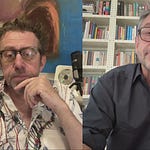Hey everybody!
I'm excited about this new video exploration as I feel it might be a great way to get ideas out, share ideas, communicate. And once again, I'd love it if anybody has questions that they would love me to address, knowing my work, basically any topic or even, it doesn't even have to be connected to my work. I will try to do it in a future video if it seems pertinent.
Today I just wanted to share a little bit about this whole complex of ideas that I keep reflecting on and which seems to me more and more important. I thought it would be interesting to open a discussion around it. As many people who follow my work know, I define myself philosophically as a monistic or analytic idealist. And essentially what this means is that I think that ultimately consciousness is the basis, the foundation, or let's say in Bernardo Kastrup's terms, the ontological primitive or primary. The material and the physical world, the material universe arises as a projection of this kind of instinctive underlying field of consciousness. And it seems to me there's more and more good evidence that supports this consciousness-first perspective, which is fairly identical to Eastern mysticism, to Indo-Tibetan Buddhism, or Vedanta, Hinduism.
Ultimately, for Tibetan Buddhists, the universe is like a dream projected by this primordial awareness or primordial mind. And we are like dream figures within this dream who can awaken to the dreamlike nature of reality. And I think that also we have the science now: The 2022 Nobel Prize for Physics went to scientists, physicists, who demonstrated over and over again that the universe is, “not locally real.” This essentially means that if there's no observer making an observation, no witness consciousness, there isn't really solid material. It's more energetic flux that then solidifies or crystallizes into the objects that we know.
And of course, there are many contemporary scientists and physicists who say that even though that applies to the micro scale sub-quantum world, it doesn't actually apply to the macro world for various reasons. But I don't think that makes too much sense. A number of thinkers and philosophers kind of refute that, including Kastrup. Another analytic idealist thinker is Amit Goswami, the quantum physicist who's written books like Physics of the Soul and The Self-Aware Universe, where he basically looks at how quantum physics and this consciousness first perspective allows us to kind of think about psychic phenomena, things like reincarnation, supernatural aspects, the subtle bodies, the chakra system, these become much more plausible. And it's actually possible to formulate a scientific hypothesis around them as quantum phenomena that exist as potentia, in the field of consciousness, but then come into kind of manifestation when an observer focuses on them.
So I think it's a huge game changer. My basic perspective is that analytic idealism is the paradigm for the future. As it replaces physicalism or reductive materialism, that will have huge beneficial impacts — transformative effects — on human society and civilization as a whole. That might sound very grandiose, but it's certainly the case with other paradigm shifts. Like for instance, the shift from a Christian eschatology to reductive scientific materialism and Empiricism led from the Medieval age to the modern age to technocratic society to capitalism, mercantilism, consumerism, materialism. These all came out of this materialist paradigm. So an idealist paradigm would most likely have tremendously transformative impacts for us, for the future.
One area that I think about a lot is magic, the psychic, the supernatural. Personally, I’ve had a number of psychic experiences, magical experiences that I know from my direct experience happened in ways that do not fit into the empirical rational construct. Another piece of this puzzle would be Rupert Sheldrake's ideas. I mean, all these ideas, they're obviously just concepts, they're like schemata or containers, but I think they really do help us. We need to walk it through with our minds, with our language, with our logic, to narrativize, in oder to understand these other possibilities that could be available to us.
Listen to this episode with a 7-day free trial
Subscribe to Liminal News With Daniel Pinchbeck to listen to this post and get 7 days of free access to the full post archives.












